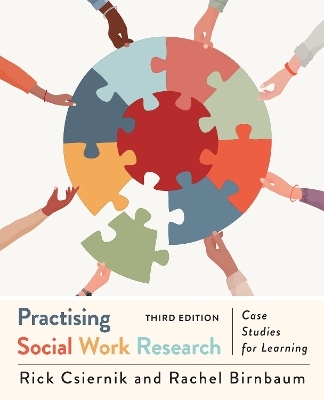
Practising Social Work Research
University of Toronto Press (Verlag)
978-1-4875-6867-2 (ISBN)
Research skills are as critical to social work practitioners as skills in individual and group counselling, policy analysis, and community development. Adopting strategies similar to those used in direct practice courses, this book integrates research with social work practice, and in so doing promotes an understanding and appreciation of the research process.
The third edition of Practising Social Work Research comprises twenty-seven case studies that illustrate different research approaches, including quantitative, qualitative, single-subject, and mixed methods. The third edition also adopts a greater equity, diversity, and inclusivity focus than the previous editions.
Through the use of applied, real-life examples, the authors demonstrate the processes of conceptualization, operationalization, sampling, data collection and processing, and implementation. Designed to help the student and practitioner become more comfortable with research procedures, Practising Social Work Research capitalizes on the strengths that social work students bring to assessment and problem solving.
Rick Csiernik is a professor in the School of Social Work at King's University College. Rachel Birnbaum is a distinguished university emerita professor in the School of Social Work at King's University College.
List of Tables
List of Figures
Preface
Acknowledgments
About the Authors
1. Introduction
The Case Study Method
The Research Process
2. Problem Solving: Brief Case Studies
Introduction: Steps in the Process of Research Identifying the Problem
Identifying the Problem
Case Study 1: Research and the Media: What Are You Being Told?
Ethics: Ensuring No Harm Comes to Participants
Case Study 2: A Question of Ethics: Willowbrook
Case Study 3: Another Question of Ethics: Studying HIV
Case Study 4: Ethical Issues of Obtaining Consent to Interview Children in Post-Separation Disputes
Case Study 5: Respectful Ethical Research Practice: Working with First Nations, Inuit, Innu, and Metis Peoples
Preparation: Conceptualizing, Operationalizing, and Sampling
Case Study 6: Understanding Ideas and Counting Them
Case Study 7: Implementing a Pilot Project: A Question of Sampling
Case Study 8: Who Do You Ask? Sampling in a Qualitative Context
Research Methods
Case Study 9: Criminal Justice Issues in Social Work Research: The Search for Causality
Case Study 10: Psychometric Properties: How Should We Measure?
Case Study 11: The Validity of Research
Case Study 12: The Application of Quasi-experimental Design in Social Work Research
Case Study 13: The Power of One: Single-Case Study Design
Case Study 14: One More: Another Example of Single-Case Study Design
Case Study 15: Asking Questions Properly: An Examination of Questionnaire Design
Case Study 16: Asking Questions about Children’s Participation: Which Approach Is Best for Children?
Case Study 17: What Does It All Mean? Qualitative Interviews with Children about Their Views and Experiences of Family Justice Professionals
Case Study 18: Q & Q: Employing Both a Qualitative and a Quantitative Approach
Case Study 19: On PAR: Engaging and Empowering Service Users through Participatory Action Research
Case Study 20: Creativity in Research: Promoting Accessibility and Inclusion Through Arts- Based Research
Prepared by Holly Kaupa
Case Study 21: Research as Response: Critical Race and Anti-Colonial Approaches
Prepared by Siham Elkassem
Case Study 22: Researching without Directly Engaging: Observational Studies
Case Study 23: The Bigger Picture: Systematic Reviews, Meta-Analysis, and Scoping Reviews
Data Collection and Statistical Analysis
Case Study 24: Measuring Service User Satisfaction: Do They Like Me?
Case Study 25: Statistics: Adding Some Numbers
Case Study 26: Descriptive Statistics: The First Step from Guessing to Knowing
Case Study 27: Inferring What You Know: Selecting an Appropriate Statistical Test
3. Examining Research Through a Critical Lens and a Theorization of Academic Voyeurism
Siham Elkassem and Andrea Murray-Lichtman
4. Critiquing Research
Introduction
Critical Analysis of Qualitative Research
Critical Analysis of Quantitative Research
A Qualitative Design: Listening to Innocence: The Effects of Islamophobia on Muslim Children
Siham Elkassem, Rick Csiernik, Andrew Mantulak, Gina Kayssi, Yasmine Hussain, Kathryn Lambert, Pamela Bailey, and Asad Choudhary
Critique
Rachel Birnbaum
A Quantitative Design: An Examination of Two Different Approaches to Visitation-Based Disputes in Child Custody Matters
Rachel Birnbaum
Critique
Barbara Decker Pierce and Rick Csiernik
Index
| Erscheinungsdatum | 28.12.2023 |
|---|---|
| Zusatzinfo | 1 b&w illustration, 43 b&w figures, 34 b&w tables |
| Verlagsort | Toronto |
| Sprache | englisch |
| Maße | 191 x 231 mm |
| Gewicht | 800 g |
| Themenwelt | Sozialwissenschaften ► Pädagogik ► Sozialpädagogik |
| Sozialwissenschaften ► Soziologie ► Allgemeines / Lexika | |
| Sozialwissenschaften ► Soziologie ► Empirische Sozialforschung | |
| ISBN-10 | 1-4875-6867-3 / 1487568673 |
| ISBN-13 | 978-1-4875-6867-2 / 9781487568672 |
| Zustand | Neuware |
| Haben Sie eine Frage zum Produkt? |
aus dem Bereich


